Please activate JavaScript in your browser to use all interface options.
Igor Sechin presented the keynote speech at the 2023 SPIEF Energy Panel
17 June 2023-350x1000.jpg)
The Energy Panel was held as part of the XXVI St. Petersburg International Economic Forum, sponsored by Rosneft Oil Company. Igor Sechin, the Company's Chief Executive Director, gave the keynote speech at the event.
The head of Rosneft in his report titled "Sodom and Gomorrah in the Energy Market: God's Wrath or Organized Chaos? Save Yourself if You Can" presented an analysis of the energy transition and climate changes. Igor Sechin paid special attention to the volatility of the global financial and economic systems, the U.S. banking crisis and the declining role of dollar as a reserve currency.
Igor Sechin also presented a roadmap for improving the efficiency of the Russian energy sector in the face of unprecedented external challenges.
The event was attended by CNPC Chairman Dai Houliang; Managing Director of ValPro India, Govinda Kottis Satish; Chairman of the Supervisory Board of ICEF (Innovation for Cool Earth Forum), a non-profit low-carbon technology initiative of the Japanese Government; Executive Director of the International Energy Agency from 2007 to 2011 Nobuo Tanaka; President of the State Oil Company of the Republic of Azerbaijan (SOCAR) Rovshan Najaf; Vice President of China and Asia Pacific's leading university, Tsinghua University, Member of the Chinese Academy of Sciences Jiang Peixue; Chairman and CEO of Oil & Petroleum Holding International Resources (OPHIR) Pedro A. Aquino Jr.; Martin Wiewiorowski and CEO and Managing Director of Kenya National Petroleum Corporation Leparan Gideon ole Morinthat.
The Energy Panel was attended by a delegation from the Bolivarian Republic of Venezuela, led by the Head of the Central Bank, as well as representative delegations from China, Azerbaijan,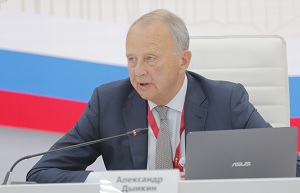 Mongolia, Indonesia, Nicaragua and Brazil.
Mongolia, Indonesia, Nicaragua and Brazil.
Also present were the sons of the legendary Nicaraguan President Daniel Ortega (Laureano and Daniel).
The Energy Panel was moderated by Alexander Dynkin, Academician of the Russian Academy of Sciences and President of the Institute of World Economy and International Relations of the Russian Academy of Sciences.
CONSEQUENCES OF “GREEN ENERGY TRANSITION”
The climate change is an objective cyclical process. The climate has been changing throughout the Earth's history, including periods of both global cooling and warming, which were related to various cycles of solar activity. All the efforts of the scientific community should be focused on studying the nature of these very phenomena, in the course of an open and unbiased discussion, Igor Sechin stated in his speech.
In his opinion, the West’s attempted utopia of a green transition has already had disastrous global consequences. "The adherents of the "green energy transition," without clearly defined goals, sound technologies, and an understanding of the long-term consequences of their actions, launched a process that created a crisis in the global energy industry and spun inflation in world markets. "All this was exacerbated by the impact of the pandemic", - Igor Sechin pointed out.
The declared energy transition is not backed up with required resources and technologies. "Unfortunately, the declared energy transition is not backed by the necessary technologies. We are faced with the fact that "renewable energy" is in fact not renewable", - the head of Rosneft said.
At the same time, petroleum technologies are currently at the peak of their development; they have no equals in technical and economic efficiency, and in terms of physical indicators - energy density and heat of combustion - they can be surpassed only by hydrogen and thermonuclear fusion technologies, which are still undeveloped.
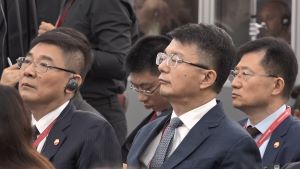 According to Igor Sechin, the fallacy of abandoning oil and gas is recognized even by oil and gas companies, which had previously staked on an accelerated energy transition, now postponing previously announced goals. Thus, for example, BP acknowledged in February of this year that the world needed oil and gas more than the company had previously expected and is investing additional $8 billion in new production projects by 2030. Shell has revised its strategic targets with a focus on long-term stability and maintaining production that provides shareholders with higher returns compared to "green" projects. ENI announced a 15% increase in investment over the 4-year horizon, mainly from oil and gas exploration and production. "To date, improving technology in conventional production has a greater effect in terms of real emission reductions than investing in immature "alternative" technologies. Thus, at the current stage of the green transition, the oil and gas sector itself should become a priority", - the head of Rosneft believes.
According to Igor Sechin, the fallacy of abandoning oil and gas is recognized even by oil and gas companies, which had previously staked on an accelerated energy transition, now postponing previously announced goals. Thus, for example, BP acknowledged in February of this year that the world needed oil and gas more than the company had previously expected and is investing additional $8 billion in new production projects by 2030. Shell has revised its strategic targets with a focus on long-term stability and maintaining production that provides shareholders with higher returns compared to "green" projects. ENI announced a 15% increase in investment over the 4-year horizon, mainly from oil and gas exploration and production. "To date, improving technology in conventional production has a greater effect in terms of real emission reductions than investing in immature "alternative" technologies. Thus, at the current stage of the green transition, the oil and gas sector itself should become a priority", - the head of Rosneft believes.
Also in his opinion, the key issue is the price of the energy transition. According to the assessment made by the IEA, by 2030 investment in "clean energy" should grow almost threefold from the current US$ 1.7 trillion to US$ 4.6 trillion per year, that is, from 2% to 5% of world GDP.
McKinsey estimates that achieving Net Zero will require at least US$ 9.2 trillion in annual spending until 2050 (which is US$ 250 trillion) on major industries alone: energy, transportation, industry, utilities, agriculture and forest-climate projects, of which US$ 3.5 trillion is for new low-emission assets and associated infrastructure.
GLOBAL WARMING AND INCREASED ENERGY CONSUMPTION
Global warming is a significant factor in the growth of energy consumption, Igor Sechin said.
According to him, ventilation and air conditioning already accounts for about 10% of the world's energy production.
"And by 2050 global demand for indoor climate could triple, surpassing the US and the EU together in terms of total energy consumption", - the head of Rosneft pointed out. The Russian oil and gas industry can meet the inevitably growing demand. This includes the resources of new fields in the country's Arctic zone.
U.S. DEFAULT - CATALYST FOR GLOBAL DISASTER
Both global practice and our own experience show that disasters are caused by a combination of factors that were not taken into account, and some of them are simply impossible to take into account, Igor Sechin pointed out.
 According to him, a chain of unforeseen circumstances is also added to these fundamental causes. "A similar unaccounted factor in the global markets decline that has already started could be, and still can be the U.S. default", - Sechin said.
According to him, a chain of unforeseen circumstances is also added to these fundamental causes. "A similar unaccounted factor in the global markets decline that has already started could be, and still can be the U.S. default", - Sechin said.
In his opinion, the systematically repeated story with the debt ceiling and the threat of a technical default by the U.S. is perceived by many as a political circus; but in fact, at the heart of the problem is the real delayed bankruptcy of the US. "The enormous debt cannot be repaid. And the further it goes, the more impossible it will be to service it at rising rates", - the head of Rosneft believes.
Over the past 30 years, the U.S. national debt has soared tenfold, from US$ 3 trillion to already over US$ 31 trillion. This is twice as fast as economic growth, and the cost of servicing it can reach US$ 1 trillion a year, which is 1/5 of the budget, and this figure is growing.
The main holders of U.S. debt are Asia-Pacific countries, especially Japan and China. They are under the biggest threat and are the ones who bear the main risks, Sechin believes. "That is, the problem with the biggest holders of U.S. debt is that Americans have a debt problem. As a famous quote of a Russian writer Ivan Krylov goes: "It's your fault that I'm hungry." Or, as the former U.S. Treasury Secretary John Bowden Connally noted back in the early 1970s, "The dollar is our currency, but your problem", the head of Rosneft pointed out during his speech.
ABANDONING THE DOLLAR MINIMIZES THE RISKS OF THE CRISIS
The dollar is becoming a problem both as a reserve currency and as an instrument of international payments, Sechin believes. At the same time, according to his words, the dollar will remain the main settlement instrument and the main reserve currency for a long time due to the huge dollar-based system of financial instruments and mechanisms to influence prices, exchange rate policy etc.
"Yes, the dollar is losing its position at an accelerating rate, but it will be dying slowly, and it is necessary to be saved urgently. And here a huge role belongs to central banks of the countries seeking to preserve their sovereignty, to organize a system of clearing, mutual settlements, swaps, financial data transfers, and new payment and settlement systems", - the head of Rosneft said.
Moving away from settlements in dollars, building new payment mechanisms and establishing new logistical chains will allow the minimization of new risks of crises, stated Igor Sechin.
"New risks bring about the necessary decisions to be taken to minimize them. These include the formation of new payment mechanisms, moving away from the dollar and creating new secure supply chains to access new markets", - he said.
According to him, now the countries of the Asia-Pacific region have started to gain the advantages that Europe used to have, and those were the basis for the competitiveness of the European.
"Lockdowns and barriers to trade and investment have led to stagnation; cooperation has been replaced by fragmentation and regionalization. Everything that we used to think of as signs of liberal democracy and free markets is ceasing to exist", - Igor Sechin said.
In his words, what is happening is the destruction of the foundations of the international law, in particular, the contract law, the destruction of the arbitration system, the destruction of all the institutions of a market economy.
"Investment cycles, which in our industry have a duration of 30 to 50 years, became subordinated to short-term electoral cycles. Long-term investment tasks are replaced by short-term opportunistic goals and political demagogy. All of this is spinning the flywheel of chaos that is heading for collapse", - the head of Rosneft said.
Igor Sechin pointed to the fact that any increase in resources today is more expensive, and we need more and more of them. "It is also necessary to take into account that all intentions, ambitions and plans for radical changes are limited by the enormous inertia of the economy, and to overcome this inertia we need additional costs and this does not guarantee the desired result", - he added.
THE RUBLE IS ONE OF THE MOST RESOURCE-BACKED CURRENCIES
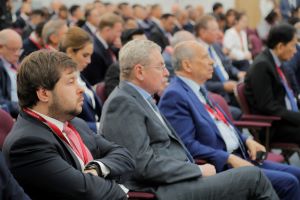 To qualify as a new reserve currency, a country must have a sufficiently large and stable economy, and free and barrier-free capital transactions as well, Igor Sechin, the Chief Executive Director of Rosneft Oil Company, pointed out.
To qualify as a new reserve currency, a country must have a sufficiently large and stable economy, and free and barrier-free capital transactions as well, Igor Sechin, the Chief Executive Director of Rosneft Oil Company, pointed out.
"The currencies backed by commodity flows, giving them weight and liquidity, become promising. Above all, it concerns the yuan. The ruble is one of the most resource-backed currencies", - he said.
However, according to Igor Sechin, there are at least two problems – a geopolitical pressure from the current hegemon and the risks associated with the lack of the targeting of the ruble exchange rate, which does not enable it to support cross-border lending and prevents the ruble from becoming a regional settlement system.
DEFICIT IN THE OIL MARKET
Speaking about the problems of global energy and the economy, Igor Sechin noted that underinvestment in the oil industry will inevitably create a deficit in the market and lead to higher oil prices.
"According to the current forecasts of the IEA and OPEC, global oil demand will grow by 2.4 mbpd in 2023, setting a new record of 102 mbpd.", - Igor Sechin said.
In the long term, physical volumes of oil consumption are estimated to grow by about 15 mbpd (+15%) by 2045, and oil, together with natural gas, will continue to satisfy more than 53% of global demand for primary energy, he pointed out.
Among the factors increasing the demand for energy, the head of Rosneft highlighted the underestimation of the real potential of consumption growth in Africa. Igor Sechin reminded that according to the UN forecast, by 2050 Africa's population will increase by 74% up to 2.49 billion people, while in other regions the population will grow by an average of only 10%. Africa will account for 34% of the world's population, up from 22% today.
At the same time, the Chief Executive Director of Rosneft cited underinvestment in the industry as the key reason for the inevitable shortage of energy resources and rising oil prices. He emphasized that Underinvestment occurs not only in production, but also in exploration, which has already led to insufficient production replenishment by the addition of new reserves (the replenishment is about 90%). The scope of exploration drilling has been steadily declining, and its focus has been on increasingly deep-water areas. Today the average size of discovered fields in the world is about 15 million tons of oil equivalent, which is not comparable with the giant discoveries of the 1970s made in that time in Saudi Arabia, Russian Siberia, and the US.
OPEX+ NEEDS MONITORING OF BOTH PRODUCTION AND EXPORTS
As Igor Sechin noted, OPEC countries are finding it more difficult to reach common solutions due to differences in economic structure and production dynamics. For example, the Middle Eastern OPEC countries are increasing production and diversifying their economies by developing the non-oil sector, while the African OPEC countries are steadily reducing production, losing their weight in the global oil market.
In this regard, the head of Rosneft believes it would be advisable to ensure monitoring not only of production quotas, but also of oil export volumes, given the different sizes of domestic markets. Since a number of OPEC+ countries export up to 90% of their oil production, while Russia at the same time supplies about 50% to the market, this puts our country in a less favorable position under the existing mechanism for assessing influence and access to key sales markets.
While announcing the current voluntary production cuts, Saudi Arabia is concurrently increasing its production capacity and its drilling rig count could grow by at least 25% in the next 2 years, as evidenced by contractor companies and the scope of contracts signed for drilling and infrastructure development, the head of Rosneft noted. Consequently, about 2 million bpd of new production capacity will be commissioned in Saudi Arabia by 2025-2027.
"Notwithstanding the record reserves life in the Middle East (Saudi Arabia and the UAE reserve-to-production ratio is about 70 years, Kuwait and Iraq - about 100 years), the mankind will face the acute problem of production capacity shortage in the years to come, and the OPEC countries will not be able to satisfy the growing demand any more", - Igor Sechin said.
RISE IN OIL PRODUCTION
Only some countries, including Russia, are able to increase the production of liquid hydrocarbons in the world in the long term, said Igor Sechin, Chief Executive Director of Rosneft.
He reminded that the record oil reserves in Venezuela, exceeding those of Saudi Arabia, remain under the strongest pressure from the U.S. In this context, Chevron is working on obtaining exemptions from the sanctions regime and has resumed imports of Venezuelan oil only to the U.S., to U.S. refineries. Country risks for Venezuela are still very high, the head of Rosneft pointed out.
 Anticipating a global shortage and with no potential for its own production growth, ExxonMobil is intensifying its control of resources in neighboring Guyana. In 2027, oil production capacity there will increase from the current 400,000 bpd to about 1.2 million bpd. However, the projected production growth in Guyana will be offset by production declines in Mexico, Canada, Norway and other countries, the head of Rosneft said.
Anticipating a global shortage and with no potential for its own production growth, ExxonMobil is intensifying its control of resources in neighboring Guyana. In 2027, oil production capacity there will increase from the current 400,000 bpd to about 1.2 million bpd. However, the projected production growth in Guyana will be offset by production declines in Mexico, Canada, Norway and other countries, the head of Rosneft said.
"Thus, only some OPEC countries, as well as Russia, actually have the potential for long-term growth of liquid hydrocarbons production in the world, as the resource base of their new projects is comparable to the resource base of all new prospective production regions in the world", - Igor Sechin said.
"We are prepared to face new challenges", - he emphasized. – "As we know, Rosneft is distinguished by the lowest per unit operating costs, financial stability, and a high level of consolidation. As a result, the company's capitalization is showing decent dynamics despite the difficulties. Against this background, the corporate principles that Rosneft has always relied on are more relevant than ever: trustworthiness, long-term commitment, and respect for partners' interests!".
ROADMAP FOR THE RUSSIAN ENERGY
Igor Sechin pointed out that the Russian energy sector is ready for the challenges. "Our stability, despite any pressure, is guaranteed, but nevertheless, there are issues whose solution will be of great importance for providing affordable energy to industry, housing sector and agriculture", the head of Rosneft said.
According to him, there are a number of tasks, the solution of which will improve the efficiency of the Russian energy industry and provide industry and household consumers with cheap and affordable energy.
In particular, according to Igor Sechin, there is an urgent need to create an international payment and settlement system that would be independent of toxic currencies.
"We cannot wait for the dollar to be replaced by one currency or another. This is a question addressed to the central banks of sovereign states and the domestic regulator", - the head of Rosneft said.
For the development of the insurance system and cross-country cooperation the support of the Central Bank is needed, but the active involvement of the market participants themselves is also important, said Igor Sechin.
The high cost of borrowing is the main obstacle to industrial development, and it is certainly one of the main issues of economic policy, Igor Sechin stated.
"It is necessary to focus the banking system on crediting the economy, subject, of course, to effective control of inflationary processes", – said Igor Sechin.
Besides, over the past 10 years, a number of systemic issues have been accumulated in the energy sector, resulting in energy price increases reaching more than 200% over this period.
"The increase in installed capacity over the same period exceeded the growth in demand by a factor of two, which led to a decrease in the installed capacity utilization factor. However, all generation, including unused and inefficient generation, continues to be paid for capacity", - the head of Rosneft said.
He reminded that a marginal pricing principle is applied in the market - all suppliers sell energy at the price of the last, least efficient generating company.
"It appears very important to exclude capacity delivery agreements for projects carried out with budgetary funds", - Igor Sechin said.
The head of Rosneft said that the reduction of tax revenues to the budget from the gas industry should not affect the redistribution of the fiscal burden in terms of increasing it in respect of oil companies.
"The thesis that comes from our financial authorities about the loss of oil and gas revenues seems incorrect because it was gas revenues that "fell out", and this has to be treated with understanding, so it is not a reason to shift the tax burden to the oil industry", - Igor Sechin said.
Construction of new gas pipelines heading east opens up the opportunity to tap into the vast resources of Eastern Siberia, where the reserves of independent producers exceed 4 trillion, the head of Rosneft said.
"It becomes possible to finally create more transparent conditions for all market participants in gas production, transportation and sales", – Igor Sechin pointed out.
According to him, opportunities for the domestic gas market development are unlocked.
"The potential freed up should be used to stimulate domestic demand for gas and accelerate gas infrastructure expansion", - Igor Sechin noted.
HEADS OF MAJOR ENERGY COMPANIES TOOK PART IN THE ENERGY PANEL
Heads of major energy companies and leading market experts also took part in the Energy Panel.
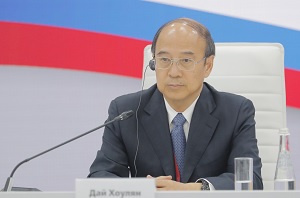 Dai Houliang, the Chairman of the Board of Directors of CNCP said during his speech that a meaningful energy transition must be realized. "We're not saying that we won't need traditional forms of energy in the future, just that there will be a change in the shares," he said.
Dai Houliang, the Chairman of the Board of Directors of CNCP said during his speech that a meaningful energy transition must be realized. "We're not saying that we won't need traditional forms of energy in the future, just that there will be a change in the shares," he said.
The head of CNPC said that the world was in a stage of profound change, which has not been seen in the last hundred years. "The international geopolitical situation is very complicated, it has an impact on international business, the production chains and supply of energy resources have been hit hard. And in such a difficult environment, we must do everything possible to help countries continue to cooperate with each other," he pointed out.
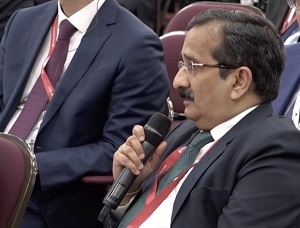 "In this regard, it is necessary to deepen energy cooperation between Russia and China in the field of oil and gas, as well as new energy sources," Dai Houliang said. "We must create new platforms, a new situation for such cooperation around the world. We must play the role of those countries that will promote cooperation built on the principles of openness and fairness. Once again I would like to emphasize that this is how we can solve all problems," he concluded.
"In this regard, it is necessary to deepen energy cooperation between Russia and China in the field of oil and gas, as well as new energy sources," Dai Houliang said. "We must create new platforms, a new situation for such cooperation around the world. We must play the role of those countries that will promote cooperation built on the principles of openness and fairness. Once again I would like to emphasize that this is how we can solve all problems," he concluded.
Vinod Kumar, Executive Director of Indian Oil, also addressed the issue of the need for cooperation to ensure energy security. According to him, Russia is a time-tested partner for India, and cooperation between the countries is actively developing. "The share of Russian crude oil imports, which was less than 2% last year, has increased tenfold to 20%. I expect this figure to reach 30% in the current fiscal year," he said.
"Thus, it is guaranteed that trade between the two countries will grow even stronger and Russia will be given a serious role in ensuring India's energy security," Vinod Kumar concluded.
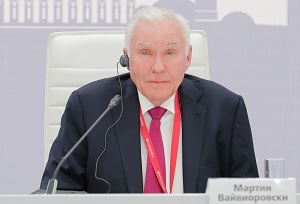 Adviser to "Advantage Energy" Martin Wiewiorowski, who has more than 40 years of experience in the oil and gas industry, including in Russia, called the changes taking place in the energy sector today incredibly significant. Among the main signs of these troubled times, Wiewiorowski singled out the lack of energy resources and the industry's significant underinvestment.
Adviser to "Advantage Energy" Martin Wiewiorowski, who has more than 40 years of experience in the oil and gas industry, including in Russia, called the changes taking place in the energy sector today incredibly significant. Among the main signs of these troubled times, Wiewiorowski singled out the lack of energy resources and the industry's significant underinvestment.
"Investments are constantly decreasing, as we note this trend at the global level, and the decline is about 5% annually. At the same time, the total CAPEX in the industry has fallen by almost 40% over the last ten years, not adjusted for inflation. We're also seeing a persistent lack of financing, which is driving up the cost of new projects," he said.
According to the expert, the Russian oil industry is doing relatively well compared to the rest of the world.
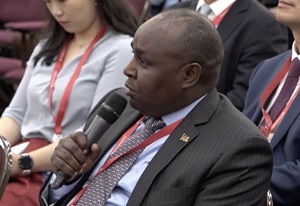 According to Leparan G. Ole Morintat, Africa is a very young and rapidly developing continent, which is why its countries need access to the energy sources.
According to Leparan G. Ole Morintat, Africa is a very young and rapidly developing continent, which is why its countries need access to the energy sources.
"Russia and Kenya have great prospects for cooperation in the field of the energy sector. "The competencies of Russian energy companies, especially such as Rosneft, in the field of geological exploration, production and construction of the relevant infrastructure can certainly help the National Oil Company of Kenya to more effectively monetize and develop the newly discovered fields in the country and effectively use our mandate to create an energy value chain. Undoubtedly, Russia can have an active presence in the Kenyan market, and more importantly, this may also involve the establishment of joint ventures," Ole Morintat said.
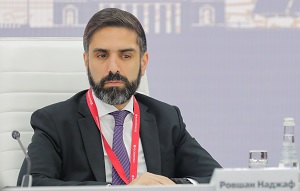 "The report of Igor Sechin that we heard clearly shows that oil and gas will be the main sources of energy for many decades to come," SOCAR head Rovshan Najaf said. - "Therefore, we need to think about how to find ways not to reduce the use of fossil fuels, but to reduce emissions".
"The report of Igor Sechin that we heard clearly shows that oil and gas will be the main sources of energy for many decades to come," SOCAR head Rovshan Najaf said. - "Therefore, we need to think about how to find ways not to reduce the use of fossil fuels, but to reduce emissions".
In his view, underinvestment in the oil and gas industry has been a problem throughout the past decade and remains one today. At the same time, financial institutions have been unwilling to finance exploration and production and have been less inclined to give loans. "We have to fight, we have to explain and clarify that there is a way to achieve this goal of reducing emissions through technology development.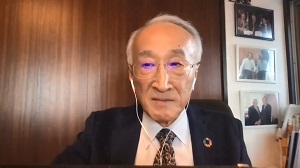 We need help, support and engagement from our partners," Najaf added.
We need help, support and engagement from our partners," Najaf added.
"Oil and gas operations now account for almost 15 percent of energy-related greenhouse gas emissions, and the industry has the capacity and resources to reduce them quickly and cost-effectively," said Nobuo Tanaka, former Executive Director of the International Energy Agency.
REPORT OF THE CHIEF EXECUTIVE OFFICER OF ROSNEFT I.I. SECHIN AT THE SPIEF ENERGY PANEL
PRESENTATION OF I.I. SECHIN`S REPORT AT THE SPIEF ENERGY PANEL
Rosneft
Information Division
June 17, 2023

-315xx70.png)

